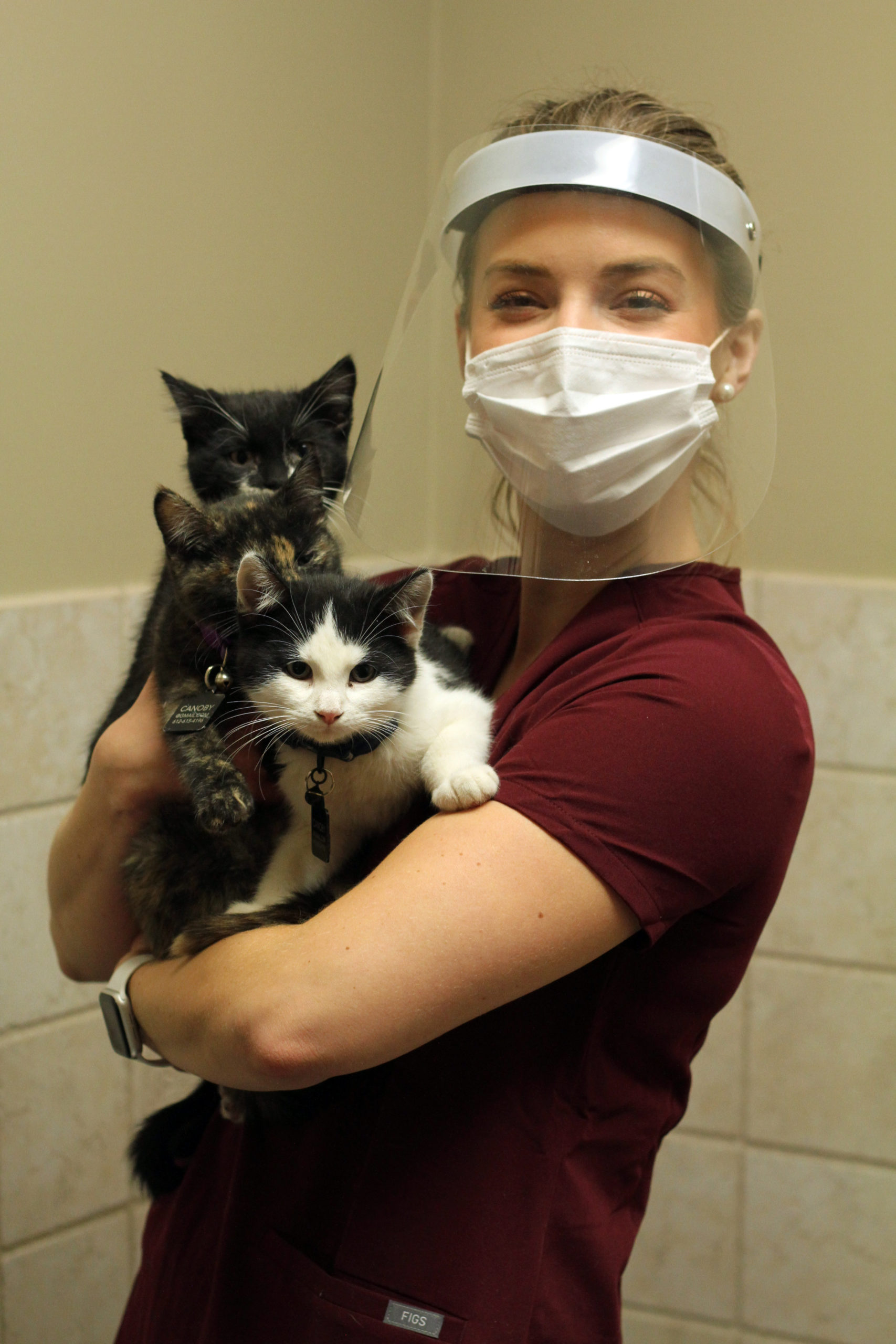GENERAL MEDICINE
Our Services
General Medicine
While prevention is our first goal, we all know that our pets can get hurt or sick. Because we are a complete, full-service veterinary hospital, we offer not only preventative services for your pet, but our veterinarians are skilled at treating your pets’ illnesses when they arise. We practice high-quality medicine that focuses on your whole pet-specific areas include dermatology, cardiology, endocrinology, ophthalmology, internal medicine, and oncology. Continuing education is important to all of our doctors and we strive to always offer you the most current medical therapy available.
Our doctors are dedicated to finding the underlying cause of your pet’s skin condition. We offer diagnostic testing including routine blood work, thyroid testing, skin scrapings, fungal and bacterial cultures, cytology, and skin biopsies.
Allergies, both environmental allergies (atopy) and food allergies, are common in pets. If your pet is diagnosed with allergies, we will discuss our recommendations for initial therapy as well as long-term management. We use a multimodal approach incorporating diet, oral medications, and topical therapies to manage your pet as effectively and safely as possible.
We also work closely with Dr. Melissa Eisenschenk at the Pet Dermatology Clinic in Maple Grove and the Animal Emergency & Referral Center as well as other dermatologists in the Twin Cities area for those patients requiring allergy testing or other advanced diagnostics.
Please inform us if your pet is experiencing any signs of a dermatology condition, including:
- Itchy skin
- Redness, hives, pimples, sores or a rash
- Hair loss
- Ear infections – redness, discharge, scratching, or head shaking
- Chewing on feet
- Scooting or licking around rectum
- Abnormal odor
- Excessively dry or greasy skin
- Parasites – fleas, ticks, lice, or mites
Cardiology
Our veterinarians and staff are dedicated to providing outstanding cardiac care for your dog, cat, bird, or small mammal. We can provide diagnostics, treatment, and management of most cardiac conditions. For more advanced cases, we partner with a mobile cardiologist, Dr. Janet Olson at Veterinary Cardiology Specialists, to provide high level cardiac care within our own practice.
We offer the following cardiac diagnostics:
- Laboratory Tests: In addition to routine blood work, we can perform specific blood tests including the Cardiopet proBNP test to assess your pet’s cardiac health.
- Digital Radiographs: We can perform digital radiographs of your pet’s heart and lungs to identify abnormalities or to provide monitoring for an existing condition. A board-certified radiologist reviews all of our radiographs.
- Electrocardiogram (ECG): For pets with abnormal heart rhythms, a Lead II electrocardiogram may be performed to evaluate the electrical activity of the heart. For advanced cases, a specialist may evaluate the results or recommend advanced diagnostics such as a six-lead ECG or a Holter monitor.
- Pulse Oximetry: Pulse oximetry evaluates your pet’s oxygen saturation and is an important diagnostic tool for pets in congestive heart failure. This is also used to monitor pets on oxygen therapy.
- Ultrasound: We have an in-house ultrasound to allow us to detect serious abnormalities such as a dilated heart, pericardial fluid (fluid around the heart), or masses associated with the heart. For echocardiography (advanced ultrasound of the heart), we recommend a consultation with our cardiologist.
Please inform us if your pet is experiencing any signs of a cardiac condition, including:
- Difficulty breathing or labored breathing
- Increased respiratory rate
- Coughing
- Exercise intolerance or other significant changes in activity
- Fainting
- Weakness
- Restlessness or inability to be comfortable, especially at night
Endocrinology
Abnormalities of the endocrine system are very common in pets. We frequently diagnose and manage the following diseases:
-
Hyperthyroidism:
This condition is most often diagnosed in cats, and is a disorder resulting from the excessive production and secretion of thyroid hormones by the thyroid gland. Common clinical signs of hyperthyroidism include weight loss, increased appetite, hyperactivity, restlessness, hair coat changes, increased water consumption and urination, vomiting, and diarrhea. We can manage your cat’s hyperthyroidism with medical therapy using methimazole. We can also provide referrals to several facilities in the Twin Cities that provide radioactive iodine (i131) therapy for treatment of hyperthyroidism. For more information on hyperthyroidism, please click here.
-
Hypothyroidism:
This condition is most often diagnosed in dogs, and is a disorder in which the thyroid gland does not produce the normal amount of thyroid hormones. The most common clinical signs include lethargy, mental dullness, inactivity, weight gain, hair coat changes, and cold intolerance. We can manage your dog’s hypothyroidism with medical therapy using thyroxine. For more information on hypothyroidism, please click here.
-
Addison’s Disease:
Addison’s Disease or hypoadrenocorticism is a metabolic disease in which the adrenal glands are not functioning appropriately to produce important compounds such as glucocorticoids or mineralocorticoids. A deficiency of glucocorticoids typically causes gastrointestinal signs such as vomiting, diarrhea, lack of appetite, abdominal pain, and weight loss. Other signs may include weakness, shivering, lethargy, difficulty walking, dehydration, or an increase in water consumption and urination. This condition can be very serious and requires prompt medical management. We can provide complete laboratory testing for this condition including routine blood work, baseline serum cortisol levels, and adrenocorticotropic hormone (ACTH) stimulation testing. Medical therapy is most often accomplished with a combination of an injectable mineralocorticoid called desoxycorticosterone pivalate (DOCP) and an oral glucocorticoid called prednisone. For more information on Addison’s Disease, please click here.
-
Cushing’s Disease:
Cushing’s disease or hyperadrenocorticism is an endocrine disorder in which there is an excess amount of cortisol (a glucocorticoid) in the body. The most common clinical signs in dogs with hyperadrenocorticism include increased water consumption, increased urination, increased appetite, panting, abdominal enlargement, bilateral hair loss, muscle weakness, and lethargy. We can provide complete laboratory testing for this condition including routine blood work and adrenocorticotropic hormone (ACTH) stimulation testing. We can also perform an abdominal ultrasound to visualize your pet’s adrenal glands if necessary. Medical therapy is most often accomplished with either trilostane or mitotane, though for some cases, surgery may be recommended. For more information on Cushing’s Disease, please click here.
-
Diabetes Mellitus:
This is a common endocrine disorder of both dogs and cats. It is characterized by a lack of insulin or an inability of insulin to function properly leading to an increase in blood glucose in the body. Increased water consumption, increased urination, increased appetite, and weight loss are the hallmark signs of diabetes mellitus. Other clinical signs may include a loss of appetite, weakness, depression, neuropathy, and abdominal pain. If these signs go unnoticed, pets may become severely ill. We can provide complete laboratory testing for the early diagnosis of this disease. Management of diabetes mellitus generally consists of dietary changes and insulin therapy, though our doctors will discuss the most appropriate therapy tailored specifically to your pet if your pet is diagnosed with this condition. For more information on Diabetes Mellitus, please click here.
We value client education at St. Francis. If your pet is diagnosed with any of these lifelong diseases, we will provide you with the resources and support for you to understand the disease and feel comfortable with your role in your pet’s care.
Ophthalmology
Ocular diseases including corneal ulcerations, keratoconjunctivitis sicca (‘dry eye’), allergic or infectious conjunctivitis, glaucoma, and other disease conditions affecting the eyes are common in all species. We can provide diagnostics, treatment, and management of most ophthalmic conditions. For more advanced cases, we partner with Dr. Robert Larocca at Animal Eye Specialty Center or Dr. Dennis Olivero at Veterinary Ophthalmology Specialty Practice .
We offer the following ocular diagnostics:
- Intraocular Pressure (IOP): We can perform intraocular pressure evaluation using a Tonopen. This tool allows us to promptly diagnose glaucoma in your pet.
- Schirmer Tear Test (STT): This test allows us to evaluate your pet’s tear production. A lack of normal tears indicates a common condition called keratoconjunctivitis sicca (KCS or ‘dry eye’).
- Fluorescein Dye: Fluorescein dye staining allows our doctors to examine the integrity of your pet’s cornea. Abrasions, scratches, or ulcerations will stain green with this test, allowing us to appropriately identify and treat the problem.
In addition, we perform basic ocular surgeries including eyelid mass removals and ocular enucleation.
Please inform us if your pet is experiencing any signs of a ophthalmic condition, including:
- Ocular discharge
- Squinting
- Redness of one or both eyes
- Cloudiness or abnormal appearance of one or both eyes
- Swelling of the eye or eyelids
- Blindness or vision changes
Internal Medicine
St. Francis Animal Hospital provides internal medicine services including the diagnosis, treatment, and management of a wide range of diseases. In addition to dermatology, cardiology, endocrinology, and ophthalmology, our doctors and highly trained staff can provide care related to the following systems:
-
Respiratory:
Pets may develop a variety of respiratory conditions including conditions that affect the upper respiratory tract (nasal passages, sinuses, larynx, and trachea) and the lower respiratory tract (bronchi, lungs, and chest cavity).
-
Urinary and Reproductive:
Our doctors can diagnose and treat diseases of the urinary and reproductive tracts include those affecting the kidneys, ureters, bladder, urethra, prostate, ovaries, uterus, and vaginal vault.
-
Gastrointestinal:
Gastrointestinal diseases are very common in our pets and include acute conditions such as gastroenteritis or intestinal foreign bodies as well as chronic conditions such as inflammatory bowel disease. In addition to the gastrointestinal tract, our doctors are skilled at evaluating your pet’s liver and pancreatic function.
-
Neurological:
Our doctors can diagnose and treat a wide variety of neurological conditions. For those pets requiring advanced diagnostics such as an MRI or a CT scan, we partner with the Animal Emergency and Referral Center, Blue Pearl, or the University of Minnesota for those services.
We offer the following internal medicine diagnostics:
- Laboratory Tests: Depending on your pet’s clinical signs, we offer comprehensive laboratory testing including serum chemistry profile, complete blood count, fecal testing, urinalysis, urine protein/creatinine ratio, endocrine testing, pancreatic testing (Spec cPL or Spec fPL), cultures, tick-borne/infectious disease screening, and fecal analysis.
- Digital Radiographs: We provide digital radiography services at St. Francis. A board-certified radiologist reviews all of our radiographs.
- Ultrasound: We have an in-house ultrasound available for rapid scans to look for major abnormalities. In addition, we have a residency-trained radiologist, Dr. Ralph Weichselbaum, who visits our clinic once monthly to provide advanced comprehensive ultrasonography services for our patients.
- Blood Pressure: We can measure your pet’s blood pressure if either hypotension or hypertension is suspected.
- Cytology: Evaluation of ear cytology, skin cytology, lymph node cytology, masses, or fluid can be performed in-house. For advanced cytology, we may recommend submitting the samples to our outside laboratory for evaluation by a pathologist.
Oncology
None of us want to hear the word cancer when it involves someone we love. Unfortunately, cancer is a common diagnosis in our pets as well as in humans, and can occur in dogs, cats, birds, and small mammals. Cancer can affect pets of any age and can occur in any of the body systems. Cancer can be obvious, such as an external lump, or can have a slow, insidious course that can be difficult to diagnose.
If your pet is diagnosed with a cancerous condition, our compassionate and highly trained team of doctors and technicians will provide you with the resources that you need. We can provide surgical therapy if appropriate, and we have partnerships with excellent oncologists at Animal Emergency and Referral Center, Blue Pearl, and the University of Minnesota for advanced therapies such as chemotherapy or radiation therapy.
If your goal is palliative or hospice care, we are here to provide your loved one with the best supportive care including pain management, nutritional support, and therapies to help with anxiety and nausea. In addition, we can provide the resources and support that you need to provide your pet with the best care possible during this time.
For more information on our palliative and hospice care services, please click here.


